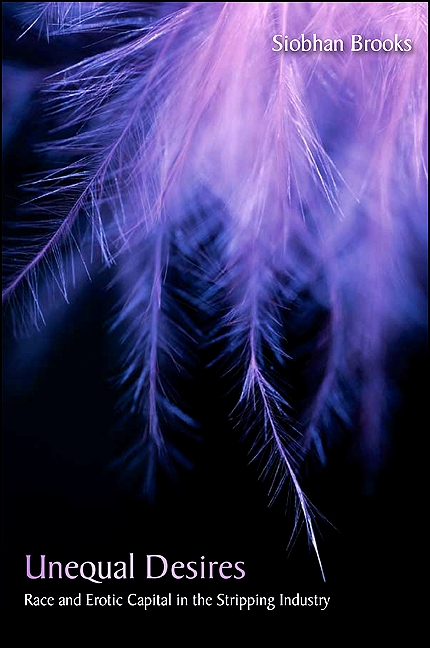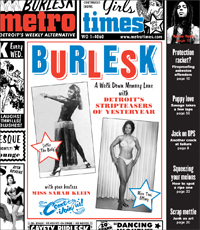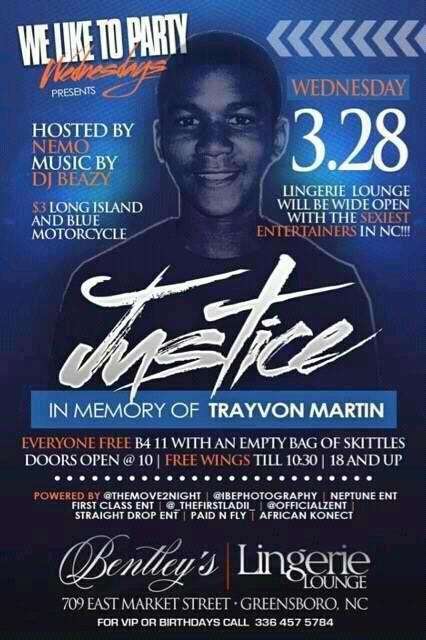Race
Unequal Desires by Siobhan Brooks (2010)
 Unequal Desires is a long overdue work that (finally!) focuses on race as central in the lives of strippers. While some of the literature on stripping focuses on race as a footnote or tangent, for Brooks, race is the central concern. Everything from everyday micro-level issues (hiring decisions, shift availability, and stage sets) to the very large-scale (zoning laws, likelihood of arrest) are explored in this book, with the conclusion that stripping is deeply racialized. Brooks uses interviews with dancers and customers as well as her own observations to confirm what she began to suspect during her time at the Lusty Lady: The strip club is another site where the black female body’s inferior position is reinforced. Through everyday actions, customers, management, and strippers all participate in its systematic devaluation.
Unequal Desires is a long overdue work that (finally!) focuses on race as central in the lives of strippers. While some of the literature on stripping focuses on race as a footnote or tangent, for Brooks, race is the central concern. Everything from everyday micro-level issues (hiring decisions, shift availability, and stage sets) to the very large-scale (zoning laws, likelihood of arrest) are explored in this book, with the conclusion that stripping is deeply racialized. Brooks uses interviews with dancers and customers as well as her own observations to confirm what she began to suspect during her time at the Lusty Lady: The strip club is another site where the black female body’s inferior position is reinforced. Through everyday actions, customers, management, and strippers all participate in its systematic devaluation.
The strip club presents the black woman’s body in strangely contradictory terms. On the one hand she is thought of as readily available, sexually. Customers may prefer a “black” club or an individual black dancer because they assume they can get more sexual contact than with a non-black dancer. On the other hand, the black female body is systematically made invisibilize or rendered unattractive. Brooks analyzes the pictures on strip club websites as evidence of this invisibility.
Brooks does attend to the clubs that may be considered “black” clubs. She considers the various, complicated motivations that black dancers have for wanting, or perhaps being forced, to work at these clubs, and simultaneously considers the social capital a “high end” (implicitly, not black) club carries as well. For many of the black dancers, hiring practices prevent them from getting in the door at clubs where they are in the minority. If they make it through the hiring process, discriminatory practices prevent them from staying.
Quote of the Week
We’re engaging in sex work, as a form of economic survival, but also as a form of validation. We have got to address this. We have got to talk about what it’s like getting up in the morning, catching the train or bus to school or work and that ride is tense because you’re the subject of giggles and whispers. […]
Or if you are passable, how you’re still not well received in your community. But then you have a sexual experience with Rahim from next door. He’s telling you you’re good enough and he’ll also pay. Suddenly you’re a commodity. You’re wanted.
Danielle King at Colorlines on being young, black, and trans in Washington DC.
Motor City Strippers!
 When I see a black woman in a filmy something or other, or clutching feathers, or posed elegantly, I have to click whatever it is to see where she came from. That’s what happened when I stumbled onto this story about burlesque dancers in the Motor City on the Metro Timessite. It begins with a line I cannot turn away from: “They called her The Body. She was built like a double order of pancakes — sweet and stacked.” And gets better and better from there. I found myself completely enthralled the entire way through!
When I see a black woman in a filmy something or other, or clutching feathers, or posed elegantly, I have to click whatever it is to see where she came from. That’s what happened when I stumbled onto this story about burlesque dancers in the Motor City on the Metro Timessite. It begins with a line I cannot turn away from: “They called her The Body. She was built like a double order of pancakes — sweet and stacked.” And gets better and better from there. I found myself completely enthralled the entire way through!
I absolutely think burlesque dancers who get paid for their work are sex workers, so to hear these women’s stories is incredibly inspiring. Lottie Graves mentioned that when she traveled, because of her fame, there’d be champagne and flowers in the room…this is something I can deal with. She also mentions that she wasn’t looked down on because “exotic dancing” was “classy.” I imagine the beaded gowns and rhinestone bikinis had something to do with it. Remind me to buy a rhinestone bikini sometime.
Going Negative In The Champagne Room: California Edition
Are California Republicans around just to make us appreciate how classy Philadelphia Republican strip club-themed ads are? Maybe! This little piece of work must be a parody, because there’s no way something like this gets taken seriously for a second. They’ve edited the face of LA city council member/congressional candidate Janice Hahn onto the body of a stripper surrounded by Black men who are holding guns and singing “Give me your cash, bitch/So we can shoot up the street/Give me your cash, bitch/So we can buy some more heat.” This is apparently based on her support for a Scared Straight-style program that worked with former gang members.
